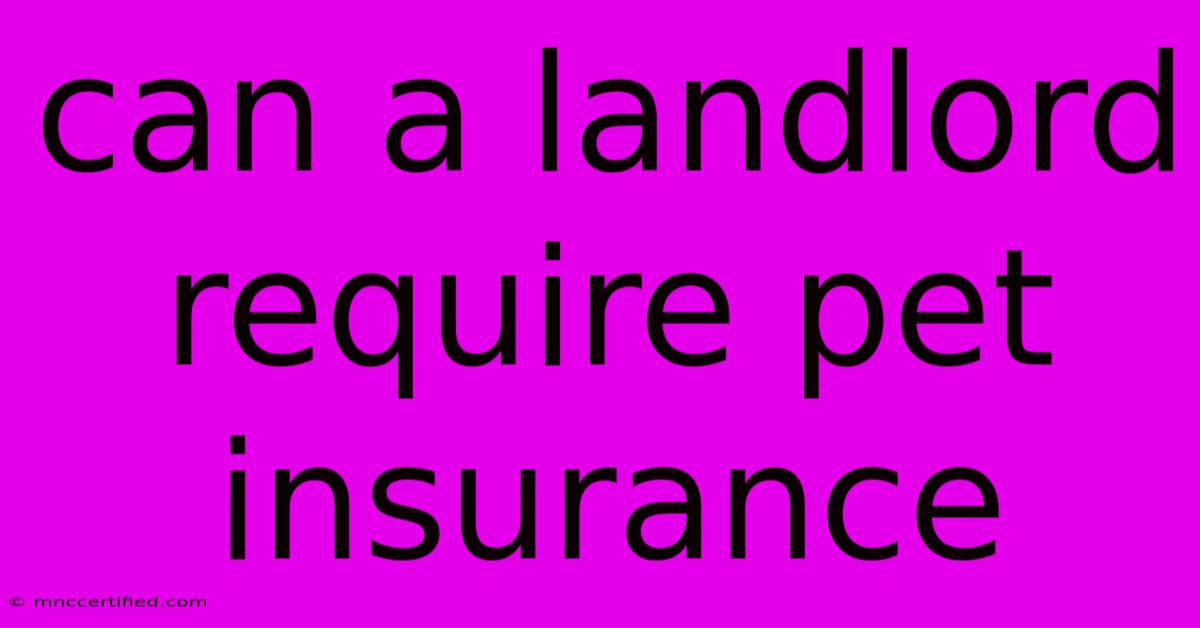Can A Landlord Require Pet Insurance

Table of Contents
Can a Landlord Require Pet Insurance?
Landlords can't force you to get pet insurance, but they can include a clause in your lease agreement that requires you to have it. This clause can be enforceable, making it crucial to understand the details and implications.
What Does a Pet Insurance Clause in a Lease Mean?
A pet insurance clause in your lease usually requires you to:
- Obtain pet insurance: This means you must have a valid policy that covers your pet for specific incidents, such as accidents, illnesses, or damage caused by your pet.
- Provide proof of insurance: Your landlord may ask for a copy of your policy or proof of coverage.
- Maintain coverage: You'll need to ensure your pet insurance policy remains active throughout your tenancy.
Legal Requirements and Enforcement
While landlords can require pet insurance, there are legal boundaries. The specifics vary by location, so it's essential to consult local laws and regulations.
General Considerations:
- Fair Housing Laws: Landlords must comply with fair housing laws, meaning they can't discriminate based on certain factors, including pet ownership. However, they can have reasonable pet policies and require insurance.
- Lease Agreement: The pet insurance clause must be clearly outlined in your lease agreement.
- Enforcement: If you fail to comply with the pet insurance clause, your landlord might have grounds to take legal action, such as demanding you obtain insurance or even terminating your lease.
Advantages and Disadvantages of a Pet Insurance Clause
Advantages for Landlords:
- Reduced Financial Risk: Landlord's insurance might not cover damage caused by pets. Pet insurance can protect them from significant financial losses.
- Increased Security: Encouraging responsible pet ownership with insurance can lead to fewer property damages.
Advantages for Tenants:
- Peace of Mind: Pet insurance offers financial protection for unexpected vet bills and potential property damage.
- Potential for Negotiating Rent: Landlords may be more willing to negotiate rent with tenants who have pet insurance.
Disadvantages for Tenants:
- Added Expense: Pet insurance can be an additional monthly cost.
- Limited Coverage: Insurance policies often have limitations, such as exclusions or caps on coverage.
Tips for Tenants with Pet Insurance Clauses
- Read the Lease Carefully: Understand the specific requirements and limitations of the pet insurance clause.
- Compare Policies: Explore various pet insurance providers to find a policy that meets your needs and budget.
- Keep Records: Maintain records of your insurance policy, including proof of coverage.
- Communicate with Your Landlord: If you have concerns about the pet insurance clause, address them with your landlord.
Conclusion
While landlords can require pet insurance, it's crucial to understand the legalities involved. Carefully review your lease agreement, research available pet insurance options, and communicate with your landlord to navigate this aspect of your tenancy effectively.

Thank you for visiting our website wich cover about Can A Landlord Require Pet Insurance. We hope the information provided has been useful to you. Feel free to contact us if you have any questions or need further assistance. See you next time and dont miss to bookmark.
Featured Posts
-
Yamal Olmo Injury Concerns For Barcelona
Nov 11, 2024
-
Nottingham Forest Vs Opponent Live Soccer Stream
Nov 11, 2024
-
Last Second Field Goal Lifts 49ers Past Bucs
Nov 11, 2024
-
Steelers Nip Commanders 28 27
Nov 11, 2024
-
Messis Team Ousted By Atlanta United
Nov 11, 2024